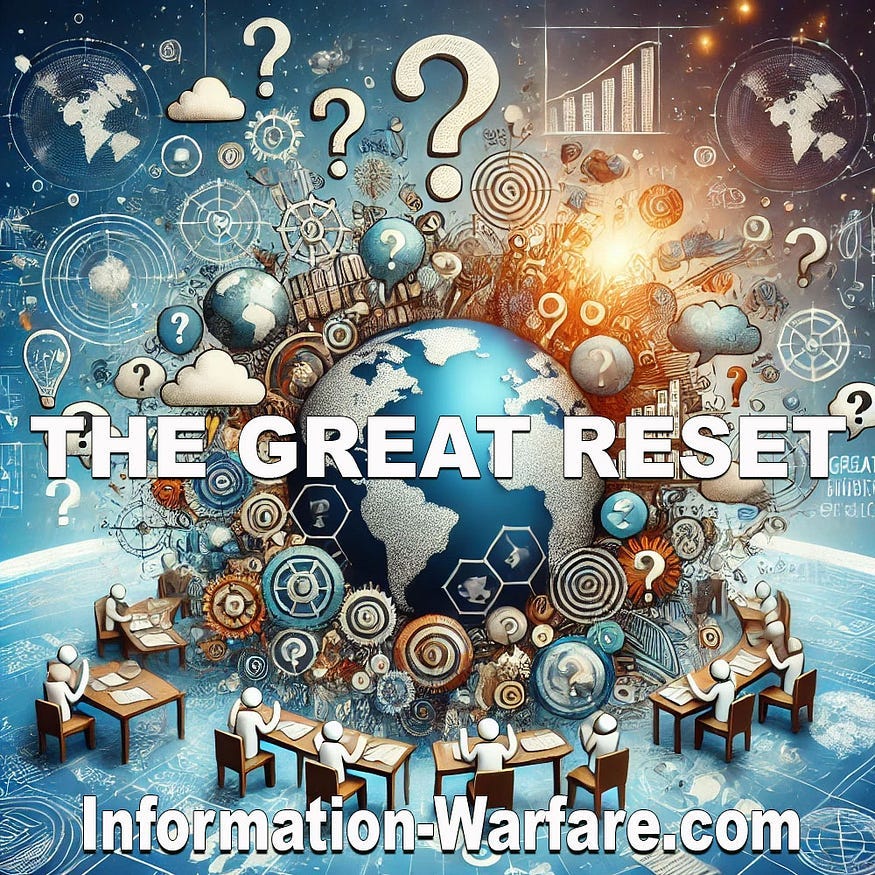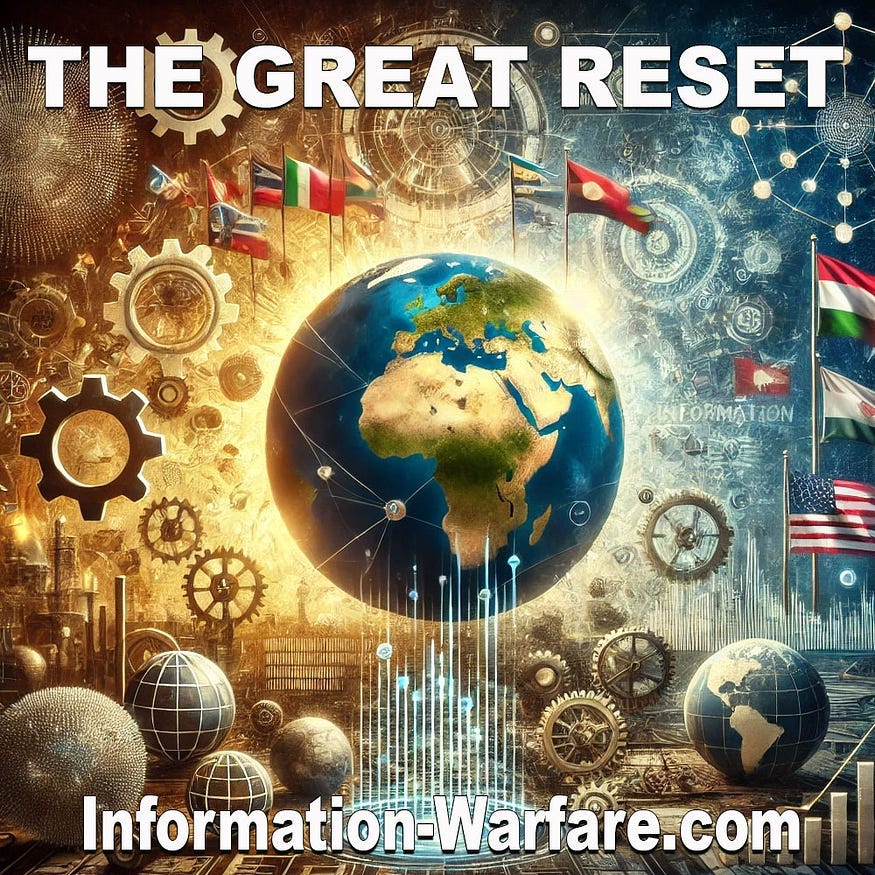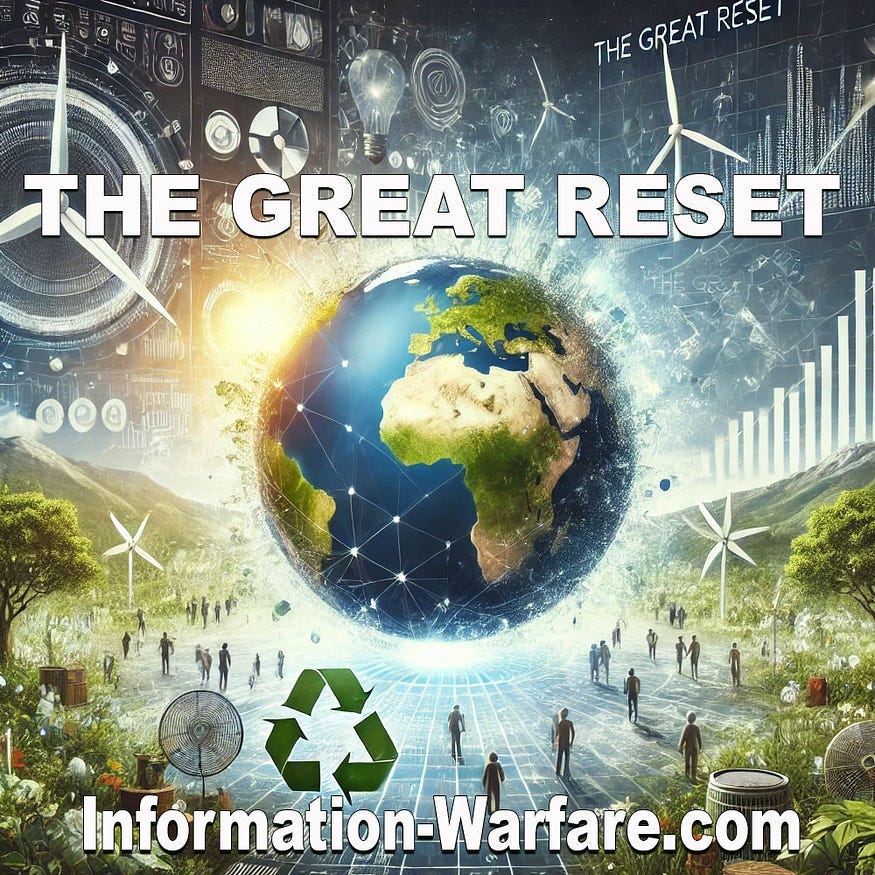The Great Reset
Rethinking the Future of Global Economy and Society
How the World Economic Forum’s Ambitious Initiative Aims to Transform Capitalism, Address Inequality, and Build a Sustainable Future Amid Controversy and Debate.
The “Great Reset” is a concept that has gained attention in recent years, particularly in the context of global economic and social recovery following the COVID-19 pandemic. The term was popularized by the World Economic Forum (WEF), particularly through its founder and executive chairman, Klaus Schwab.
Key Aspects of the Great Reset:
Origins and Purpose:
The Great Reset was introduced by the WEF in June 2020 during the height of the COVID-19 pandemic. The idea was to use the pandemic as an opportunity to rethink and reshape the global economy and society to make them more equitable, sustainable, and resilient.
The initiative calls for a fundamental rethinking of capitalism and economic systems, advocating for changes that prioritize environmental sustainability, social justice, and a shift towards stakeholder capitalism, where businesses serve the interests of all stakeholders, including employees, communities, and the environment, rather than just shareholders.
Three Main Components:
Fairer Economic Outcomes: This involves reforms to wealth distribution, tax systems, and regulations to promote equity and reduce inequality.
Sustainability and Environmental Goals: The Great Reset emphasizes the need for a “green” recovery, with investments in renewable energy, sustainable industries, and technologies that mitigate climate change.
Harnessing Technology and Innovation: The initiative advocates for using technological advancements to improve societal well-being, promote health and education, and support the transition to more sustainable economic models.
Criticism and Controversy:
Conspiracy Theories: The Great Reset has been the subject of numerous conspiracy theories, particularly in online forums and social media. Critics have falsely claimed that it is a plot to impose a global socialist government, reduce individual freedoms, or radically reshape the world economy for the benefit of elites.
Legitimate Concerns: Some critics argue that the Great Reset could lead to increased government intervention in economies, potentially stifling innovation and entrepreneurship. Others worry that the focus on global cooperation could undermine national sovereignty or that the proposed changes might disproportionately benefit large corporations and the wealthy.
Debate on Feasibility: There is also debate about the feasibility of implementing the Great Reset’s ideas on a global scale, given the diverse political, economic, and cultural contexts of different countries.
Impact on Global Discussions:
The Great Reset has influenced global discussions on how to rebuild and reshape economies post-pandemic. It has encouraged debates about the future of capitalism, the role of governments in economic planning, and the need for international cooperation on issues like climate change and inequality.
The Great Reset is an ambitious initiative that seeks to address some of the most pressing challenges facing the world today, including inequality, environmental degradation, and the need for more inclusive economic systems. While it has sparked significant interest and debate, it has also been met with skepticism and controversy. The success and impact of the Great Reset will depend on how its ideas are implemented and whether they can balance the interests of various stakeholders in a complex and interconnected global landscape.

As of now, the “Great Reset” remains a topic of ongoing discussion, planning, and debate, rather than a fully implemented set of policies or actions. Here’s an overview of its current status:
1. Ongoing Discussions and Forums:
The World Economic Forum (WEF) continues to promote the ideas behind the Great Reset through its annual meetings, publications, and various global forums. The WEF has positioned the Great Reset as a long-term vision rather than a short-term plan, aiming to influence the direction of global economic and social policy in the coming years.
2. Integration into Policy Discussions:
Some of the concepts and goals of the Great Reset, such as sustainability, stakeholder capitalism, and social justice, have been integrated into national and international policy discussions. For instance, the emphasis on a “green recovery” is evident in the climate commitments made by various governments and international organizations, especially in the context of post-pandemic recovery.
3. Criticism and Misinformation:
The Great Reset continues to be a subject of controversy. Conspiracy theories and misinformation surrounding the initiative have persisted, particularly in online communities. These theories often misrepresent the goals of the Great Reset, suggesting it is part of a larger, nefarious agenda. The WEF has addressed some of these concerns, but the misinformation has led to polarized views on the initiative.
4. Adoption by Governments and Corporations:
While the Great Reset itself is not a formal policy, many of its principles align with ongoing initiatives by governments and corporations. For example, environmental, social, and governance (ESG) criteria have become increasingly important in the corporate world, reflecting the stakeholder capitalism idea promoted by the Great Reset.
5. Challenges and Critiques:
Critics argue that the Great Reset’s ambitious goals may be difficult to achieve on a global scale, given the diverse political and economic contexts of different countries. There are also concerns about the potential for increased government intervention in economies and whether the benefits of the Great Reset will be equitably distributed.
6. Public Awareness and Engagement:
Public awareness of the Great Reset varies widely. While it is a well-known concept within policy-making and business circles, the broader public remains divided, with some viewing it as a necessary transformation and others as an overreach.
The Great Reset remains a guiding framework for rethinking global economic and social systems in response to the challenges posed by the COVID-19 pandemic and beyond. It continues to shape discussions on sustainability, equity, and innovation, but it is also met with skepticism and criticism. The actual impact and success of the Great Reset will likely become clearer in the coming years as its ideas are either adopted, modified, or rejected by governments, businesses, and societies worldwide.

The Great Reset and Today’s Geopolitics
The “Great Reset” and current geopolitical information warfare are interconnected in several ways, particularly through the lenses of narrative control, ideological battles, and the influence of global power structures. Here’s how they correlate:
1. Narrative Control and Information Warfare:
Framing the Narrative: The Great Reset has become a focal point in the global narrative battle, where different actors seek to shape public perception and influence global opinion. Proponents of the Great Reset frame it as a necessary response to the challenges of the 21st century, emphasizing sustainability, equity, and innovation. However, opponents, including various political groups and conspiracy theorists, frame it as a threat to national sovereignty and individual freedoms. This clash of narratives is a core element of information warfare, where controlling the story can sway public opinion and policy decisions.
Misinformation and Disinformation: The Great Reset has been targeted by misinformation and disinformation campaigns, particularly in online spaces. Conspiracy theories falsely portray the Great Reset as a globalist plot to impose authoritarian control, which fuels distrust and division. These narratives are often amplified by state and non-state actors in information warfare to weaken trust in international institutions like the World Economic Forum (WEF) and to destabilize democratic societies.
2. Ideological Battles:
Competing Ideologies: The Great Reset represents a push towards a more interconnected, cooperative global order that prioritizes sustainability and social equity. This vision is often at odds with nationalist, populist, and anti-globalist ideologies that are gaining traction in various parts of the world. Information warfare often capitalizes on these ideological divides, using the Great Reset as a symbol of the globalist agenda to rally support for nationalist movements that resist international cooperation and integration.
Cultural and Economic Warfare: The Great Reset is not just about environmental and economic policies; it also touches on cultural and social issues, such as wealth redistribution and corporate governance. These aspects are contested in the global ideological struggle, with information warfare tactics used to either support or undermine the Great Reset’s principles, depending on the interests of the actors involved.
3. Geopolitical Power Struggles:
Global Influence: Major global powers, including the U.S., China, Russia, and the European Union, have different stances on the Great Reset and its underlying principles. Information warfare is used by these powers to promote their own models of governance and economic systems, often positioning the Great Reset as either a threat or an opportunity depending on their geopolitical goals.
Undermining International Cooperation: Some state actors use information warfare to disrupt the global consensus on issues like climate change, economic reform, and social justice, which are central to the Great Reset. By spreading misinformation and amplifying dissenting voices, these actors aim to weaken the international cooperation that the Great Reset seeks to enhance.
4. Public Opinion and Electoral Politics:
Influencing Elections: Information warfare around the Great Reset is also used to influence electoral politics. By framing the Great Reset as either a progressive step forward or a dangerous overreach, various political factions aim to sway voters in key democracies. This can impact elections, referenda, and public policy, with long-term consequences for global governance.
Conclusion:
The Great Reset is deeply intertwined with the current landscape of geopolitical information warfare. It serves as a battleground for competing narratives, ideologies, and power structures in an increasingly polarized world. How the Great Reset is perceived and implemented will depend on the outcomes of these information battles, making it a significant element in the broader context of global politics and governance.
#GreatReset #SustainableFuture #WEF #GlobalEconomy #SocialJustice #Innovation #ClimateAction #StakeholderCapitalism


